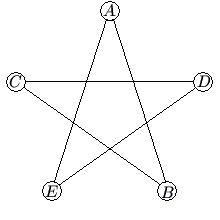Difference between revisions of "2005 AMC 10A Problems/Problem 17"
(→Solution) |
|||
| Line 19: | Line 19: | ||
[[Category:Introductory Algebra Problems]] | [[Category:Introductory Algebra Problems]] | ||
| + | {{MAA Notice}} | ||
Revision as of 10:30, 4 July 2013
Problem
In the five-sided star shown, the letters ![]() ,
, ![]() ,
, ![]() ,
, ![]() , and
, and ![]() are replaced by the numbers
are replaced by the numbers ![]() ,
, ![]() ,
, ![]() ,
, ![]() , and
, and ![]() , although not necessarily in this order. The sums of the numbers at the ends of the line segments
, although not necessarily in this order. The sums of the numbers at the ends of the line segments ![]() ,
, ![]() ,
, ![]() ,
, ![]() , and
, and ![]() form an arithmetic sequence, although not necessarily in this order. What is the middle term of the sequence?
form an arithmetic sequence, although not necessarily in this order. What is the middle term of the sequence?
![]()
Solution
Each corner (a,b,c,d,e) goes to two sides/numbers. (A goes to AE and AB, D goes to DC and DE). The sum of every term is equal to ![]()
Since the middle term in an arithmetic sequence is the average of all the terms in the sequence, the middle number is ![]()
See Also
The problems on this page are copyrighted by the Mathematical Association of America's American Mathematics Competitions. 










